December 26-2014

Two prominent intellectuals, speaking at a public event in Tehran, have said the country’s nuclear program is a waste of money that has done more damage to Iran than the eight-year war with Iraq.
The blunt and public criticism of a program the regime treats as unchallengeable may well bring trouble to the two speakers, Sadeq Zibakalam, a professor at the University of Tehran, and Ahmad Shirzad, a former Reformist deputy in the Majlis.
Zibakalam has criticized the program before, but reached a new level of hostility last week.
“The imposed war [with Iraq] did not damage us as much as the nuclear program has,” Professor Zibakalam said at a December 17 roundtable at the University of Tehran, according to reports by Iranian news agencies.
Zibakalam also criticized the lack of public debate about the nuclear issue. Any policy embraced by the Supreme Leader is considered non-debatable by the regime—just as before the revolution, no policy embraced by the Shah could be debated in public.
Speaking at the same event, Shirzad said nothing had come out of the nuclear program, “not even a glass of water.”
“If you ask me why we’re moving on the nuclear path, I must say I have no idea,” Shirzad was quoted as saying by the Iranian Students News Agency (ISNA). “This is exactly like the continuation of the war [with Iraq] after the liberation of Khorramshahr,” he said, attacking a decision taken by Ayatollah Khomeini more than three decades ago.
While Shirzad said he welcomed the official line opposing the acquisition of nuclear weapons, he also criticized the civil nuclear program. “Iran doesn’t have the primary resources and know-how for a nuclear program,” he said. He argued that Iran could assert itself in areas such as petrochemicals and natural gas, where the country has the resources and the knowledge.
Former diplomat and professor Davoud Hermidas Bavand told the audience Iran’s nuclear program should not be compared to the nationalization of the oil industry in 1951, a comparison made repeatedly by Mahmud Ahmadi-nejad when he was president.
“What happened under the government of [Prime Minister Mohammad] Mossadegh was a struggle for rights under international laws. But in the nuclear issue, the resistance against bullying has been going in a direction that, in the long run, some other inalienable rights of the people are being [taken away],” Bavand said.
Shirzad complained that the nuclear issue has turned into a matter of “honor.”
“When something becomes a matter of honor, discussing it is not possible anymore. And that has been our problem for the past 11 years,” he said.
Zibakalam said, “Unfortunately from 2003 to 2013, debate about the different aspects of the nuclear issue was not possible. I believe that whenever people and the press are prevented from expressing their opinions on different issues, the result is not good.”
He added that during those years whenever he would send a slightly critical piece to the press, “the editors would dump it in the closest trash can.”
Zibakalam said it was hardliners opposing nuclear talks with the West who have now opened up the opportunity to criticize the nuclear program.
He pointed to those who criticized the nuclear deal reached in Geneva a year ago, charging that Iran had made too many concessions. “For the first time, the general policies of the establishment were challenged,” he said.
A number of officials, including Ali-Akbar Velayati, the chief foreign policy adviser to the Supreme Leader, have publicly told critics to tone down their criticism of Rohani’s government over the nuclear negotiations.
Velayati said on November 30 that since the Supreme Leader had endorsed an extension of the talks for several months, people should stop their criticism.